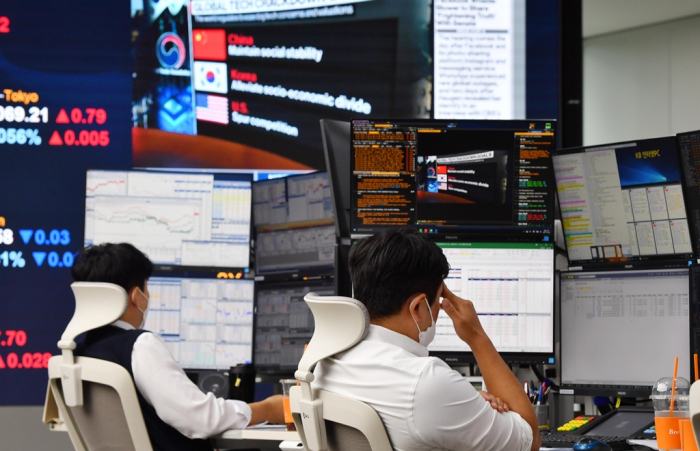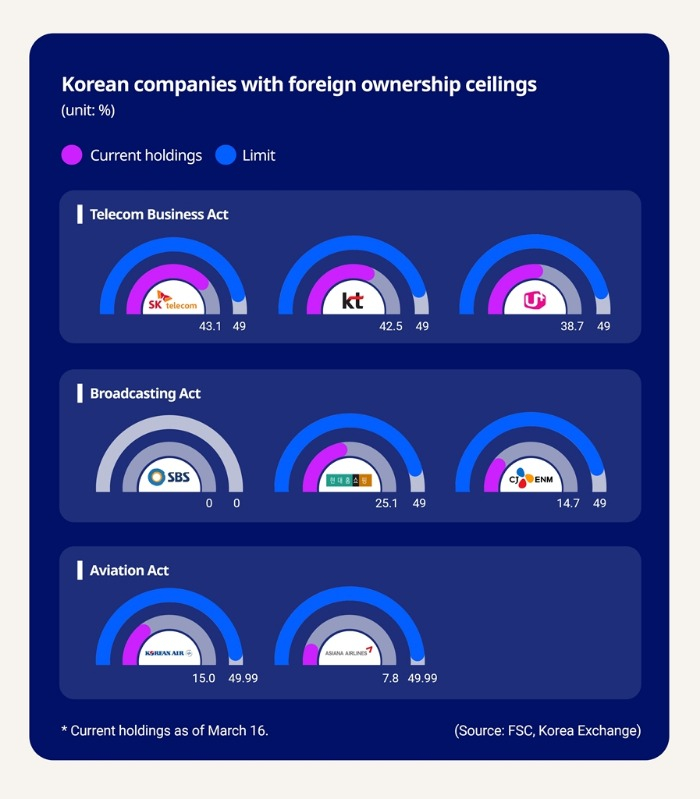Regulations
Korea to ease foreign ownership limit rules; MSCI upgrade eyed
The government is also considering measures to protect key companies if limits are significantly eased or lifted completely
By Mar 17, 2023 (Gmt+09:00)
3
Min read
Most Read
LG Chem to sell water filter business to Glenwood PE for $692 million


KT&G eyes overseas M&A after rejecting activist fund's offer


Kyobo Life poised to buy Japan’s SBI Group-owned savings bank


StockX in merger talks with Naver’s online reseller Kream


Meritz backs half of ex-manager’s $210 mn hedge fund



South Korea plans to ease regulations that limit foreign ownership of big companies deemed crucial to its economy as the government aims to align its policy with global standards to remove uncertainty for investors and ensure fair competition.
According to Ministry of Economy and Finance officials on Friday, the government has started reviewing the removal or relaxation of foreign ownership limits on 33 companies in telecom, aviation, broadcasting, newspaper and other key industries.
The economic regulatory innovation task force, a joint public-private level review body, will also discuss the issue to work out practical measures.
“Since foreign ownership ceilings are stipulated differently by individual laws, nearly all economy-related ministries need to get together to address the issue,” said a finance ministry official.
The government will also work out measures to protect local companies if it decides to completely remove foreign ownership ceilings, he said.
Under the current Telecommunications Business Act, foreigners can own up to 49% of six domestic telecom operators, including SK Telecom Co., KT Corp. and LG Uplus Corp.

The Broadcasting Act limits foreign ownership of 12 Korean companies, including entertainment powerhouse CJ ENM Co., Hyundai Home Shopping Network Corp. and LG HelloVision Co. to 49%. For YTN, the 24-hour news channel, the ceiling is 10%. Some broadcasters such as SBS, KNN and TBC are off-limits to foreign ownership.
Foreign stake holdings in Korea’s two energy behemoths – Korea Electric Power Corp. and Korea Gas Corp. – are limited to 40% and 30%, respectively, under the Capital Markets Act and the Public Enterprise Privatization Act.
HURDLES TO MSCI UPGRADE
Such limits have often been a source of complaints among foreign investors interested in Korea’s blue-chip stocks.
MSCI, one of the world’s leading index providers, has cited Korea’s opaque stock-related rules and foreign ownership limits as "the Korea discount," or reasons for not raising the country to developed market status.
The Korea discount refers to a tendency for Korean companies to have lower valuations than their global peers due to factors such as low dividend payouts, the dominance of opaque family-run conglomerates known as chaebol and geopolitical risk relating to North Korea.
Since Korea was first categorized as an emerging market in 1992, the global index compiler has also taken issue with the country’s poor market accessibility.
Market accessibility is one of the key criteria alongside economic development, market size and level of liquidity for the MSCI to categorize a country as a developed, emerging or frontier market.
Other global stock market index providers, such as Dow Jones, S&P and FTSE, have classified the Korean equity market as developed.

APPROACHING UPPER LIMITS
For some telecom companies, foreign shareholdings are approaching the limit.
As of Thursday, foreigners owned 43.1% of SK Telecom, 42.5% of KT and 38.7% of LG Uplus.
“If such limits are lifted, many undervalued Korean blue chips will see another round of meaningful share price hikes. An MSCI upgrade will also lead to heavy fund flows into Korea,” said the head of research at a local brokerage company.
Some industry officials have raised concerns, however, about potential national security risks and the growing influence of foreign capital in the Korean financial markets.
“Companies like KT, whose ownership is dispersed among individual investors, could be susceptible to foreign takeover if foreign ownership limits are significantly raised or abolished altogether,” said an industry official.
In advanced countries such as the US, there are no specific ownership limits on foreign investors. Instead, investors are subject to a regulatory review when trying to acquire a certain percentage stake in a company.
Developing countries, including India and Vietnam, restrict foreign acquisitions under regulations similar to Korea’s.
Write to Hyung-gyo Seo and Jin-gyu Kang at seogyo@hankyung.com
In-Soo Nam edited this article.
More to Read
-
 Foreign exchangeS.Korea to extend trading hours of local forex market
Foreign exchangeS.Korea to extend trading hours of local forex marketJan 13, 2023 (Gmt+09:00)
2 Min read -
 Korean stock marketKorea to revise dividend policy to ease ‘Korea discount’ concerns
Korean stock marketKorea to revise dividend policy to ease ‘Korea discount’ concernsNov 24, 2022 (Gmt+09:00)
3 Min read -
 MarketsShort-selling ban keeps Korea from MSCI’s developed-markets index
MarketsShort-selling ban keeps Korea from MSCI’s developed-markets indexJun 22, 2021 (Gmt+09:00)
3 Min read -
 Korean stock marketKorea reiterates reform plans to join MSCI developed markets
Korean stock marketKorea reiterates reform plans to join MSCI developed marketsApr 25, 2022 (Gmt+09:00)
1 Min read
Comment 0
LOG IN


